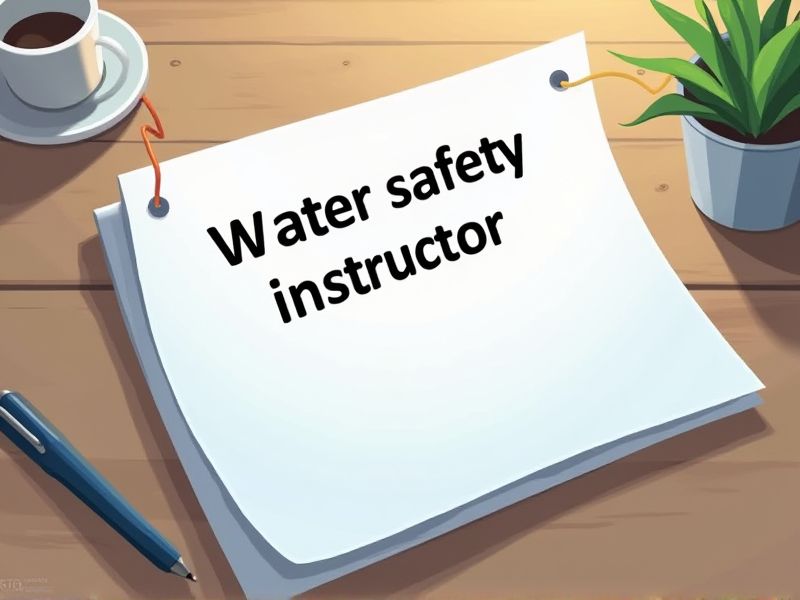
Ensuring water safety requires a comprehensive understanding of water dynamics and rescue techniques, which is why water safety instructors need certain certifications. These certifications equip instructors with essential knowledge in risk assessment, first aid, and rescue operations, enhancing their ability to prevent and respond to emergencies. Accredited certifications ensure adherence to standardized safety protocols, building trust among learners and institutions. Here are some important certifications you may need to become a Water Safety Instructor.
American Red Cross Water Safety Instructor Certification
The American Red Cross Water Safety Instructor Certification ensures that instructors possess comprehensive knowledge of water safety and effective teaching techniques. This certification enhances the ability of instructors to conduct swimming lessons safely, reducing the risk of water-related accidents. By adhering to the rigorous standards set by the American Red Cross, instructors can deliver consistent and high-quality training, instilling confidence in their students. The certification also serves as a recognized credential that can enhance employment opportunities in aquatic centers and water safety programs.
American Swimming Coaches Association Water Safety Instructor Certification
The American Swimming Coaches Association Water Safety Instructor Certification provides instructors with the latest pedagogical techniques essential for effective swimming instruction. This certification ensures instructors are equipped with comprehensive knowledge of water safety protocols, reducing the risk of accidents. Holding this certification indicates a standardized level of competency, which is vital for maintaining public trust and confidence in aquatic programs. Many facilities require this certification as a prerequisite for employment to ensure all staff meet consistent safety and instructional standards.
Lifeguard Certification
Lifeguard certification provides essential training in emergency response techniques necessary for handling aquatic emergencies. It ensures water safety instructors can effectively manage risks and prevent accidents by understanding fundamental water rescue skills. The certification also covers CPR and first aid, which are crucial for immediate care during incidents. Comprehensive knowledge gained from certification programs enables instructors to foster a safer aquatic environment for all participants.
CPR/AED Certification
Water safety instructors interact with individuals in aquatic environments, where the risk of drowning or cardiac events is higher, necessitating CPR/AED certification to effectively respond to such emergencies. Certification ensures instructors possess the skills to maintain safety standards, enhancing trust among participants and their guardians. Timely CPR and AED use increases survival rates during cardiac incidents, aligning with the life-saving goals of water safety programs. Enhanced capability to address emergencies reinforces the role of instructors as first responders, contributing to a safer aquatic environment.
First Aid Certification
First Aid Certification equips a Water Safety Instructor with essential skills to respond to emergencies, reducing the risk of severe injury or death during aquatic activities. With proper training, instructors can quickly identify signs of distress or potential hazards, ensuring a safer environment for participants. Certification ensures instructors comply with legal and organizational standards, which can enhance their credibility and employability. Possessing first aid knowledge allows instructors to act confidently and efficiently, fostering trust among participants and their families.
Water Rescue Technician Certification
Water Rescue Technician Certification equips instructors with advanced skills for handling complex water emergencies, thereby enhancing overall safety. The certification ensures instructors can perform and supervise high-risk rescues, which reduces the likelihood of accidents. With this expertise, instructors gain credibility, fostering trust from clients and organizations. The certification aligns with legal requirements, protecting facilities and instructors from liability issues during water-related activities.
Aquatic Facility Operator Certification
Aquatic Facility Operator Certification ensures that water safety instructors have comprehensive knowledge of facility operations, enhancing overall safety. It equips instructors with skills in water quality management, which is crucial for preventing illnesses and ensuring a healthy environment. This certification provides expertise in risk management, aiding instructors in effectively identifying and mitigating potential hazards. Employers often require this certification to meet regulations and maintain high standards for facility maintenance and safety training.
Emergency First Response Certification
The Emergency First Response Certification equips water safety instructors with essential skills in CPR and first aid, which are critical in effectively responding to water-related emergencies. Possessing this certification ensures instructors can maintain a safe environment by quickly addressing any injuries or health incidents that occur during their watch. Employers and parents often seek assurance of an instructor's preparedness, and this certification verifies their competency in handling emergencies. This preparation heightens overall trust and safety in aquatic environments, reducing potential liabilities and risks.
Pool Operator Certification
Pool operator certification provides essential knowledge on maintaining water quality, ensuring a safe environment. Proper chemical management prevents waterborne illnesses, directly impacting public health. Understanding equipment operation helps in identifying and mitigating potential hazards. This certification reinforces adherence to safety regulations, reducing liability risks for facilities.
Scuba Diver Rescue Certification
A scuba diver rescue certification provides water safety instructors with essential skills to manage emergencies, reducing potential fatalities in diving scenarios. Mastery in rescue techniques ensures prompt and effective response, enhancing the safety of all participants in aquatic environments. It equips instructors with the knowledge to assess risks and make informed decisions, thus minimizing accidents. This certification fosters confidence in both instructors and participants, promoting a safer learning and recreational experience underwater.
Summary
When you obtain certifications as a Water Safety Instructor, you enhance your skill set, making you more attractive to potential employers. Certifications validate your expertise, allowing you to teach water safety with confidence and authority. They also increase your knowledge in injury prevention and rescue techniques, leading to safer environments for students. Enhanced credibility and specialized skills improve your career prospects and provide a competitive edge in the aquatic field.
